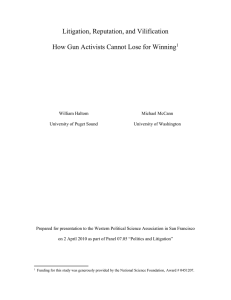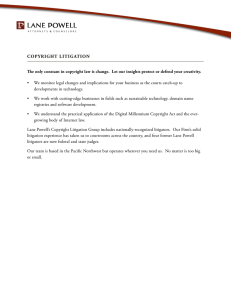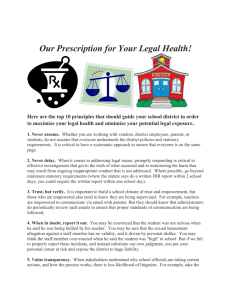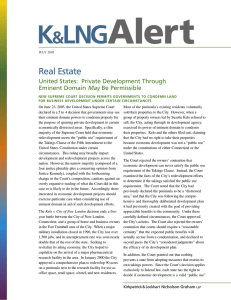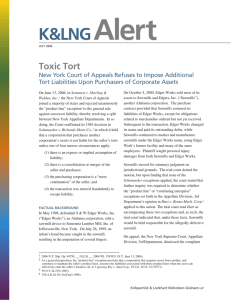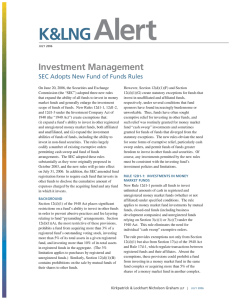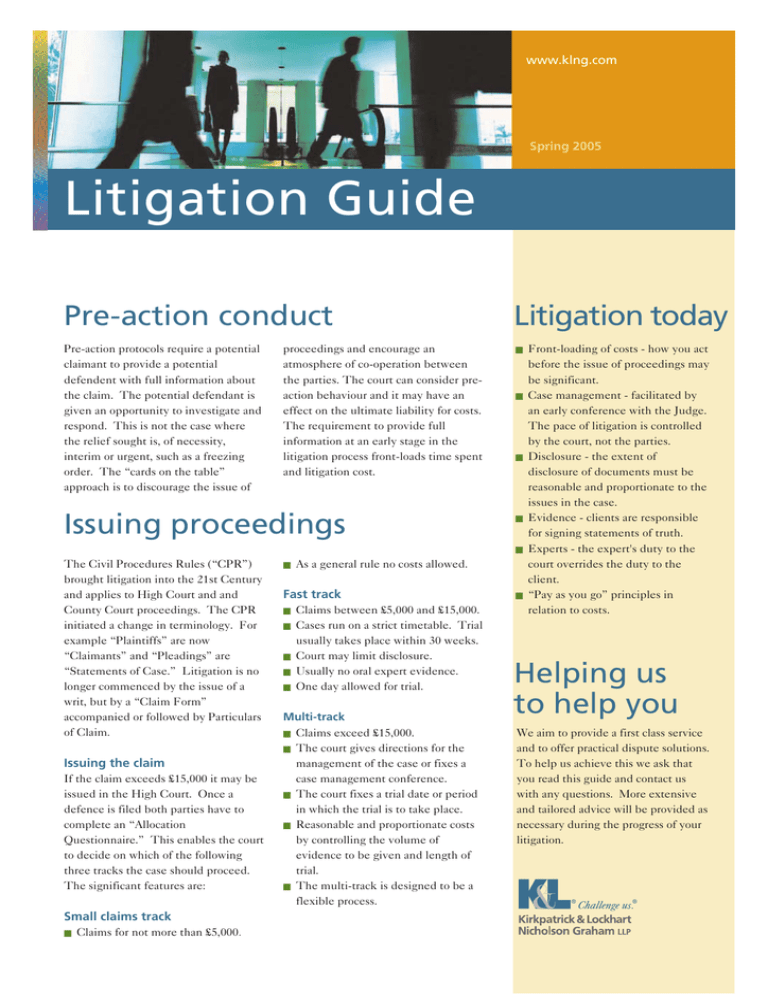
www.klng.com
Spring 2005
Litigation Guide
Pre-action conduct
Litigation today
Pre-action protocols require a potential
claimant to provide a potential
defendent with full information about
the claim. The potential defendant is
given an opportunity to investigate and
respond. This is not the case where
the relief sought is, of necessity,
interim or urgent, such as a freezing
order. The “cards on the table”
approach is to discourage the issue of
proceedings and encourage an
atmosphere of co-operation between
the parties. The court can consider preaction behaviour and it may have an
effect on the ultimate liability for costs.
The requirement to provide full
information at an early stage in the
litigation process front-loads time spent
and litigation cost.
Issuing proceedings
The Civil Procedures Rules (“CPR”)
brought litigation into the 21st Century
and applies to High Court and and
County Court proceedings. The CPR
initiated a change in terminology. For
example “Plaintiffs” are now
“Claimants” and “Pleadings” are
“Statements of Case.” Litigation is no
longer commenced by the issue of a
writ, but by a “Claim Form”
accompanied or followed by Particulars
of Claim.
Issuing the claim
If the claim exceeds £15,000 it may be
issued in the High Court. Once a
defence is filed both parties have to
complete an “Allocation
Questionnaire.” This enables the court
to decide on which of the following
three tracks the case should proceed.
The significant features are:
Small claims track
Claims for not more than £5,000.
As a general rule no costs allowed.
Fast track
Claims between £5,000 and £15,000.
Cases run on a strict timetable. Trial
usually takes place within 30 weeks.
Court may limit disclosure.
Usually no oral expert evidence.
One day allowed for trial.
Multi-track
Claims exceed £15,000.
The court gives directions for the
management of the case or fixes a
case management conference.
The court fixes a trial date or period
in which the trial is to take place.
Reasonable and proportionate costs
by controlling the volume of
evidence to be given and length of
trial.
The multi-track is designed to be a
flexible process.
Front-loading of costs - how you act
before the issue of proceedings may
be significant.
Case management - facilitated by
an early conference with the Judge.
The pace of litigation is controlled
by the court, not the parties.
Disclosure - the extent of
disclosure of documents must be
reasonable and proportionate to the
issues in the case.
Evidence - clients are responsible
for signing statements of truth.
Experts - the expert's duty to the
court overrides the duty to the
client.
“Pay as you go” principles in
relation to costs.
Helping us
to help you
We aim to provide a first class service
and to offer practical dispute solutions.
To help us achieve this we ask that
you read this guide and contact us
with any questions. More extensive
and tailored advice will be provided as
necessary during the progress of your
litigation.
Litigation Guide
Disclosure
The CPR was designed to limit the
volume of documents disclosed whilst
still capturing the documents required
for an effective trial of the issues. The
parties may vary or limit disclosure by
consent, but the usual proviso is that
parties give “Standard Disclosure.”
You must disclose documents upon
which you rely to support your case and
conversely those documents that may
adversely affect your case or support
another party's case. Litigants are
under a duty to make a “reasonable
search” for documents. The search
must be described in a “Disclosure
Statement.” The person who makes
the Disclosure Statement is named and
must state why they are the appropriate
person to sign the Disclosure
Statement. In each case, we will make
you aware of the type of documents
that need to be disclosed. Disclosure is
an ongoing obligation throughout the
litigation. Any documents that re-
surface or come into being and which
come within the test of Standard
Disclosure must be disclosed.
Increasingly, documents may be
disclosed in an electronic format.
There are also rules in the CPR which
permit:
access to documents held by persons
who are not a party to the litigation;
pre-action disclosure.
Extend or shorten time for
compliance with any rule.
Adjourn or bring forward a hearing.
Hold a hearing and receive evidence
by telephone.
Control the issues to be tried.
Order a case management
conference.
In many multi track cases the Court
holds a case management conference,
2
SPRING 2005
We aim to provide a first class service and
to offer practical dispute solutions.
These mechanisms provide ways of
identifying useful evidence. It also
means that an application for disclosure
and inspection may be made against
you even though you are not a party to
litigation.
There are special provisions allowing
for Specific Disclosure and Specific
Inspection. Applications for this type
Case
management
There are a number of mechanisms in
the CPR which enable the court to
control litigation. These include
powers to:-
of disclosure are more likely to be
made in more complex multi-track
cases, for example, where a disgruntled
opponent considers that the search
undertaken has been too narrow, or
because an incorrect view has been
taken as to the nature of documents
which would support or adversely
affect the case.
commonly referred to as a “CMC,” in
order to identify and deal with as many
issues as possible at an early stage and
fix a trial date as soon as practicable.
Where solicitors are acting, a legal
representative familiar with the case
and with sufficient authority to deal
with likely issues must attend the
CMC. In some instances we will
suggest that you attend the CMC,
especially if you have discrete goals.
CMCs are generally acknowledged to
have been a success. They work well
in limiting the issues to be tried and
establishing an effective trial timetable.
Expert evidence
The court, has the power to limit
expert evidence to that which is
necessary and proportionate to the
amount of money in dispute or the
complexity of the case. An expert
report must state the substance of all
material instructions and identify any
contrary body of opinion. The first
obligation of an expert witness is to the
court, not the client, and the report
must contain a specific statement from
the expert that he has complied with
and understands his duty to the court.
We will advise whether it is appropriate
to retain an expert for specific prelitigation advice. Such a report is to the
client alone, not the court. It may
range from general preparatory work to
obtaining an informal and privileged
opinion letter. A preliminary report
may assist with the preparation of the
statement of case or with the
appropriate instructions to the expert
appointed in the litigation. The
assosciated costs cannot generally be
recovered in the litigation.
www.klng.com
Statements of truth
The Statements of Case and witness
statements are accompanied by a
Statement of Truth. For corporate
clients, the person signing the
statement of truth on behalf of the
company must be of sufficient seniority
and sufficiently close to the
management of the litigation to sign
such a document. We may sign the
statement on your behalf but the Court
will assume that the contents of the
Statement of Truth and the
consequences of signing it have been
explained to you. You take
responsibility for it and ultimately
these documents constitute the
evidence upon which the parties may
be cross-examined at trial. We need to
work with you closely on the detail of
Court documents. You must identify at
an early stage who will take
responsibility for signing the Statement
of Truth. We suggest that you make all
important documents available at the
same time, so that we can advise
whether they are consistent with the
facts accompanying any Statement of
Truth. A detailed and factually
accurate Statement of Case must be
provided at the outset; it may not be
possible (or desirable) to expand your
case later without good cause or to
deny an allegation without fully setting
out what you believe to be the contrary
position.
Budgeting
Strict timetabling under the CPR allows
us to budget more effectively and give
more accurate assessments of the level
of costs. We aim to provide you with a
reasonable estimate of the cost of the
litigation at the outset. To do this we
need you to provide:
as
much information as possible;
any documentation available; and
details of your objectives/goals.
This process also enables us to allocate
the appropriate resources to the case. In
the event that there are developments
which change our views as to the budget
then we will let you know as soon as
possible.
Alternative dispute resolution
More familiarly known as “ADR,” the
most common form is mediation. The
Allocation Questionnaire allows for the
parties to opt jointly for a stay of up to
one month for the purposes of settling
the dispute by ADR, so the concept of
alternative dispute resolution is built
into the litigation process. The court
can also order such a stay of its own
initiative or extend the stay for any
period it thinks fit. In every case the
judge asks the parties if they have
attempted to settle using ADR and if
not, to explain why. There may be
adverse costs consequences if a party
unreasonably refuses an offer to
mediate. Every member of our
litigation department can advise you
about ADR. Not all cases are suitable
for mediation and we will advise you
when and how to attempt it.
Alternatively we will provide you with
an adequate explanation as to why you
should not.
after the issue of proceedings. The
offer need not necessarily relate to the
whole claim but may refer to part of it.
Where the offer is accepted within the
prescribed time, the claimant is
entitled to costs up to the date of
acceptance. If the claimant fails to
better a Part 36 payment at trial, or to
obtain a judgment on a non-money
claim which is more advantageous than
a Part 36 offer, he must pay the costs
incurred by the defendant after the
time for acceptance of the offer - unless
the Court thinks this unjust.
Offers to settle
Defendant's offer to settle
The CPR sets out a revised code for
making offers, known as “Part 36”
offers, that have financial
consequences. A defendant may make
an offer to settle at any time before the
commencement of proceedings
provided that, where the claim includes
a claim for money, the defendant
makes a payment (into court) after
service of the Claim Form. Likewise
the same type of offer can be made
Claimant's offer to settle
A claimant can also make a “Part 36”
offer to settle both before and after
commencement of proceedings. If the
offer is accepted within the prescribed
time, the claimant will be able to
recover costs incurred up to the date of
acceptance. If the claimant is
continued on page 4
SPRING 2005
3
Litigation Guide
continued from page 3
ultimately awarded more than his offer
to settle or obtains a judgment which is
materially more advantageous than his
offer, the court may order interest on
the award at a rate not exceeding 10%
above base rate. The Court also has the
power to order costs to be paid on the
indemnity basis plus penalty interest.
These rules give claimants new
leverage to induce early settlement
discussions.
It is our fundamental aim to use the art of
dispute resolution as a tool to meet your
goals. The CPR helps us to do this more
effectively and we look forward to working
with you more closely to achieve those
goals.
Costs
The general rule is still that the loser
pays the winner's costs, but the court
also takes into account all other circumstances, including the conduct of the
parties, success on some or all of the
issues and any Part 36 payments or
offers. In particular, the court has
regard to the pre-action protocols, any
refusal to make reasonable admissions
and any failure to negotiate, mediate or
otherwise comply with the overriding
objective. Costs are generally awarded
on a standard basis, but only if they
have been reasonably incurred on a
scale proportionate to the matters in
issue.
These provisions are relevant when
considering what work is required to be
done during the course of litigation -
especially with regard to expert evidence and your own particular goals in
litigation - and what may be regarded
as proportionate by the court.
One of the most significant features of
the CPR relates to the “pay as you go”
principle. Under the pre-CPR rules,
notwithstanding any costs orders made
during the course of litigation, costs
would not be payable until the end of
the case and, in some cases, many
months after the litigation had concluded. The CPR introduced summary
assessments of costs. In all applications
to the court lasting less than one day
the court makes a summary assessment
of costs for that hearing, a liability
which the paying party must discharge
within 14 days.
Who to Contact
Kirkpatrick & Lockhart
Head of Dispute Resolution and Litigation (London Office) John Magnin
Nicholson Graham LLP
Specialist Groups
Arbitration
Banking & Pensions Disputes
Construction Disputes
Commercial Disputes
Elections
Employment Disputes
Insolvency Disputes
Insurance Coverage Disputes
Intellectual Property Disputes
Property Disputes
Securities Enforcement
Travel Disputes
Sports Disputes
Ian Meredith
Anne McCarthy
James Hudson
John Magnin
Piers Coleman
Paul Callegari
Antony Griffiths
Jane Harte-Lovelace
Dominic Bray
Jane Harte-Lovelace
Robert Hadley
Cynthia Barbor
John Magnin
imeredith@klng.com
110 Cannon Street
amccarthy@klng.com
London EC4N 6AR
jhudson@klng.com
www.klng.com
jmagnin@klng.com
pcoleman@klng.com
T: +44 (0)20 7648 9000
pcallegari@klng.com
F: +44 (0)20 7648 9001
agriffiths@klng.com
jharte-lovelace@klng.com
dbray@klng.com
jharte-lovelace@klng.com
rhadley@klng.com
cbarbor@klng.com
jmagnin@klng.com
Kirkpatrick & Lockhart Nicholson Graham is a combination of two limited liability partnerships, each named Kirkpatrick & Lockhart Nicholson Graham LLP, one
established in Delaware, USA, and one incorporated in England.
This publication/newsletter is for informational purposes and does not contain or convey legal advice. The information herein should not be used or relied upon in
regard to any particular facts or circumstances without first consulting a lawyer.
Unless otherwise indicated, the lawyers are not certified by the Texas Board of Legal Specialization.
Data Protection Act 1998 - We may contact you from time to time with information on Kirkpatrick & Lockhart Nicholson Graham
LLP seminars and with our regular newsletters, which may be of interest to you. We will not provide your details to any third parties.
Please e-mail cgregory@klng.com if you would prefer not to receive this information.
4
SPRING 2005
© 2005 KIRKPATRICK & LOCKHART NICHOLSON GRAHAM LLP. ALL RIGHTS RESERVED.


